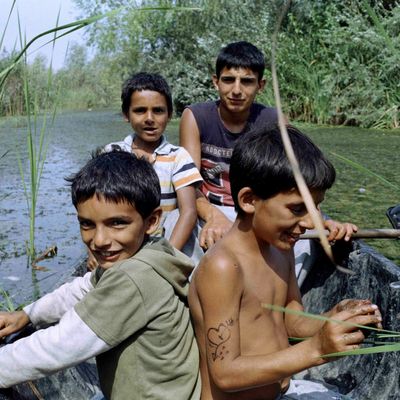
Acasa, My Home opens with a lovely image of telling dissonance. A teenage boy wades among the reeds of a pleasant lake, surrounded by soft, bucolic light, while in the background the towers of a high-rise apartment complex loom, distant and ghostly. Soon, his younger brothers join him in the water, cavorting among the ducks and cranes and otters, a whole bevy of wild children seemingly without a care in the world. And yet, those buildings remain in the distance. Not long after, a drone shot — a technique overused in recent documentaries, but deployed carefully here — reveals the confounding reality of what we’re watching: an immense span of wilderness in the heart of the Romanian capital of Bucharest. We see the kids’ home: a rundown, homemade shack covered in sheets and rugs to keep the weather out. We see the lakes and meadows surrounding it. And then we see an embankment and a highway, beyond which stretches an urban sea of concrete and steel as far as the eye can see.
Initially intended to be the site of a reservoir but never actually filled up, Vacaresti Nature Park has stood there for decades, neglected by bureaucrats and slowly emerging as a rich marshland with startling biodiversity, the largest urban wilderness in Europe. It’s also the unofficial home of a man named Gica Enache, who with his wife and nine children — not to mention a few pigeons, chickens, dogs, cats, and pigs — has resided here for nearly 20 years, away from the world in a kind of impoverished, idyllic life off the grid.
Shot over three years, Radu Ciorniciuc’s film follows Gica and his family as their existence is interrupted by the growing demands of the modern world. But Acasa is not exactly a movie about paradise lost. Ciorniciuc seamlessly blends intimacy and lyricism with a clear-eyed honesty about what he’s depicting. We spend nights with this family, everyone piled on top of each other in their tiny, cozy, trash-strewn home. We watch the kids cavort in the fields and streams, exploring and horsing around without a care in the world. The Enaches are free but also desperately poor. Gica, who serves as a kind of unofficial ranger for the park (or maybe he just thinks he does), is emotional, volatile, even a little manipulative — he is, in many ways, as much a child as his kids are. He abandoned life in the city to live here, he says, because he was angry at “this wicked world,” and his anger has clearly not subsided. His kids know no life other than the park. Nor will they, if Gica has his way: When some volunteers show up at Christmas with gifts, he takes the books they’ve given the kids and uses them as kindling for the stove. Occasionally, people from child services come, and the kids have to go and hide in the woods.
There’s an understated velocity to Ciorniciuc’s storytelling. Seasons pass. Years pass. Acasa clocks in at under an hour and a half, but we see Vacaresti transformed and the Enache family sent into an existential tailspin. A massive fire in the park forces the government’s hand. In the blink of a cinematic eye, officials — including the prime minister, and Prince Freaking Charles — are visiting, and efforts begin to turn this huge, forgotten swamp into something more meaningful. We see Gica looking on curiously as dignitaries do their rounds. We see his children staring quizzically at the colorful backpacks of kids rolling through on school field trips. Yuppies come to picnic. Sure enough, Gica and his family are asked to relocate, to move into the city so the kids can go to school and so the Enaches can finally fall in line with how the rest of the world sees them: as poor and ignorant.
Over and over in this poisoned pastoral, the lost dream of the idyll clashes with the sad workings of reality. The most agonizing shots in the film might be those of a bulldozer carrying off the small, seemingly inconsequential pile of wood and rugs that was once this family’s home. Gica, a diabetic who drinks and smokes constantly, doesn’t get to see his home demolished, because he’s in the hospital, hooked up to a drip; living off the grid, it turns out, isn’t exactly great for one’s health. At their new school, the kids can’t even spell their own names. They have no idea what to do with the tiny apartment they’ve all been forced into. The boys wander the streets, trying to do the things they did in nature with the urban landscape. They wade into the river, under a sign that forbids swimming. They hang off light posts as if they were branches. They stare at other kids, eager to make friends but unsure how. Life becomes a debilitating series of social-worker visits, neighbor arguments, complaints about filth. It’s like the walls are closing in, both spiritually and literally.
But again, Ciorniciuc wants to tell a more complicated story. In the city is also where the Enaches’ oldest, the resourceful and charming Vali, finds his independence, striking out on his own and starting to butt heads with his father. The kids are remarkably adaptable, their curiosity about the world around them endless. In many ways, despite the unique circumstance of the Enaches’ existence, their story is the story of just about every family, as a parent’s grip on a child’s reality loosens and life finally begins to take over. The secret of this beautiful, bittersweet film about a group of people like no other is that, in the end, it’s all so shockingly relatable.
More Movie Reviews
- Fernanda Torres Is a Subtle Marvel in I’m Still Here
- Grand Theft Hamlet Is a Delightful Putting-on-a-Show Documentary
- Presence Is the Best Thing Steven Soderbergh’s Done in Ages


